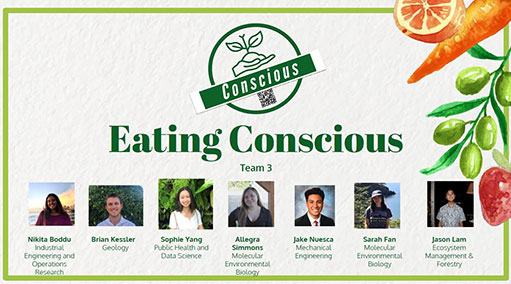Berkeley, CA (December 7, 2020) — Students in the Fung Fellowship at the University of California, Berkeley, are collaborating with three Earth Island Institute projects to address real-world problems and develop viable solutions in the spheres in which the projects work. The three projects are Save Our Soil, which works to stop the use of hazardous ingredients in fertilizer; Shark Stewards, an international program dedicated to saving sharks and ocean habitat; and EFC West, which empowers vulnerable populations and builds community capacity.
The 58 undergraduate students are enrolled in the Fung Fellowship’s new Conservation + Tech course. The primary component of the course is the “design challenge,” where students work in interdisciplinary teams to propose technology solutions for the real-world conservation problems the program’s partner organizations are tackling. For Save Our Soil, the students explored how technology can help farmers better understand the environmental impacts of fertilizers and make more eco-friendly fertilizer choices.
“There is perhaps no bigger driver of change to natural ecosystems than agriculture,” said Dan Zevin, who is advising on and managing the course for the Fung Fellowship. “When looking at forests alone, it is undeniable that millions of acres of habitat are lost each year to crop, cattle, and other similar commodity-based production. And once such land conversions are made, agricultural-based land practices still have dramatic negative effects on any surrounding natural systems, which can also be detrimental to human health.”
One scarcely researched and debatable practice is the use of waste-sourced materials in fertilizers and other soil improvement products. Farmers need to make economically sound purchasing and application decisions when applying soil amendments. In the meantime, municipalities and waste-generating industries are constantly looking for new ways for disposing of toxic waste. When relatively cheap sewage sludge and other waste materials are deemed safe for agricultural uses, it may seem like a win-win scenario for all involved. But by looking more closely at these practices, questions remain about whether the practices are truly safe, whose authority can be trusted, and what alternative practices and/or trust systems can be examined.
At this juncture, the importance of the program and its benefit to both students and organizations becomes obvious. Students take problems in real time and learn how to research and create solutions to complex challenges. In return, the participating organizations receive new, innovative ideas that offer a fresh perspective on the challenges they face.

Ten Fung Fellowship student teams presented their final challenge solution pitches to Save Our Soil in October. Most solutions were multifaceted, and many incorporated ideas for improving environmental awareness and decision-making support for farmers, as well as home gardeners, such as building both local and national online community networks, starting up new farmer-run nonprofit organizations, and creating online tools for accessing vetted information from soil researchers and other experts, as well as from local and national databases. Their presentations and solutions were backed up with significant research findings and also included detailed mock prototypes (e.g.,web and mobile applications), and even one working prototype of a mobile app to teach the next generation of farmers about more sustainable farming practices through a fun, interactive game.
“The work put in by the students was incredible. There are some real possibilities that could help farming practices become greener and our food supply and environment become cleaner. I appreciated all their work and their well-thought-out solutions to one of the biggest environmental problems we face,” said Patricia Martin, executive director of Save Our Soil.
Save Our Soil will now look for ways to integrate the ideas proposed by the students or use the ideas to seek funding for an expansion of its work.
The students will examine the work of Sharks Stewards and EFC West in upcoming sessions, and present their findings via similar detailed presentations.